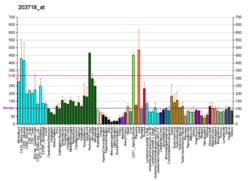| ADP-specific glucokinase | |||||||||
|---|---|---|---|---|---|---|---|---|---|
| Identifiers | |||||||||
| EC no. | 2.7.1.147 | ||||||||
| CAS no. | 173585-07-4 | ||||||||
| Databases | |||||||||
| IntEnz | IntEnz view | ||||||||
| BRENDA | BRENDA entry | ||||||||
| ExPASy | NiceZyme view | ||||||||
| KEGG | KEGG entry | ||||||||
| MetaCyc | metabolic pathway | ||||||||
| PRIAM | profile | ||||||||
| PDB structures | RCSB PDB PDBe PDBsum | ||||||||
| Gene Ontology | AmiGO / QuickGO | ||||||||
| |||||||||
| ADPGK | |||||||||||||||||||||||||||||||||||||||||||||||||||
|---|---|---|---|---|---|---|---|---|---|---|---|---|---|---|---|---|---|---|---|---|---|---|---|---|---|---|---|---|---|---|---|---|---|---|---|---|---|---|---|---|---|---|---|---|---|---|---|---|---|---|---|
| Identifiers | |||||||||||||||||||||||||||||||||||||||||||||||||||
| Aliases | ADPGK , 2610017G09Rik, ADP-GK, ADP-specific glucokinase, ADP-dependent glucokinase, ADP dependent glucokinase | ||||||||||||||||||||||||||||||||||||||||||||||||||
| External IDs | OMIM: 611861; MGI: 1919391; HomoloGene: 41739; GeneCards: ADPGK; OMA:ADPGK - orthologs | ||||||||||||||||||||||||||||||||||||||||||||||||||
| |||||||||||||||||||||||||||||||||||||||||||||||||||
| |||||||||||||||||||||||||||||||||||||||||||||||||||
| |||||||||||||||||||||||||||||||||||||||||||||||||||
| |||||||||||||||||||||||||||||||||||||||||||||||||||
| |||||||||||||||||||||||||||||||||||||||||||||||||||
| Wikidata | |||||||||||||||||||||||||||||||||||||||||||||||||||
| |||||||||||||||||||||||||||||||||||||||||||||||||||
In enzymology, an ADP-specific glucokinase (EC 2.7.1.147) also known as ADP-dependent glucokinase is an enzyme that catalyzes the chemical reaction
Contents
- ADP + D-glucose AMP + D-glucose 6-phosphate
Thus, the two substrates of this enzyme are ADP and D-glucose, whereas its two products are AMP and D-glucose 6-phosphate.
This enzyme belongs to the family of transferases, to be specific those transferring phosphorus-containing groups (phosphotransferases) with an alcohol group as acceptor.
In humans, the ADP-dependent glucokinase is encoded by the ADPGK gene. [5]





